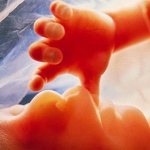Written by Kathy Clubb
“Everywhere the need exists for maternal sympathy and help, and thus we are able to recapitulate in the one word motherliness that which we have developed as the characteristic value of woman. Only, the motherliness must be that which does not remain within the narrow circle of blood relations or of personal friends; but in accordance with the model of the Mother of Mercy, it must have its root in universal divine love for all who are there, belaboured and burdened.” – St. Edith Stein
St Edith Stein reminds us that all women have a vocation to motherhood, whether this be biological or spiritual or both. Caring for others, injecting gentleness into this often hostile world, is intrinsic to women, and is a most valuable gift which is common to mothers, single women and even to those who are infertile.
It is for this reason that promoting adoption comes very naturally to some pro-lifers. From their point of view, the idea makes perfect sense: couples who can’t conceive have an opportunity to care for a child whose biological parents aren’t able to care for them. The pro-life community then has an another alternative to offer abortion-minded women. Governments can allocate fewer resources into caring for state wards. Seen from this emotional, practical and economic aspect, the benefits of adoption are not negligible. Many also see a spiritual aspect to adoption: that God can use adoption to provide couples who suffer from infertility with a child. The pro-life movie, LifeMark, certainly underscored the theme of adoption being an act of God’s Providence and that Christian couples usually take their obligation to raise a child in the faith very seriously. Here’s how one adoptive mother from Australia explained her desire to care for non-biological children:
“Our wish was to always have a big family. Both my husband and I love children. I recall him saying he wanted to make up a football team! We were blessed with a son, who bought us so much joy and love. But our dreams of having a football team never came to pass.
After trying for many years for more children with no success, Our Lord had other plans for us. We took the road to become foster carers and have discovered other ways to bring children to know the Faith and love God. We have had close to 20 children in our care and with the grace of God, we are in the process of taking a child permanently into our care.
My husband and I are extremely grateful for the opportunity Our Lord has given us to give a child a much needed home and teach him the way of the faith. God bless and please keep us in your prayers.”
These comments from a loving Catholic mother exemplify how adoption can be an heroic form of spiritual motherhood: accepting the child of a stranger into one’s home, with a view to raising that child full time as one’s own.
It brings great comfort to those who care deeply about children to know that there exist families who are willing to take a stranger’s child into their home. Likewise, adopting a child can be the means of sanctification for the adoptive parents, and potentially, for the biological ones. However, problems arise when adoption is thrust into equal place with motherhood as an alternative to abortion. A frank assessment of our attitudes and of adoption’s drawbacks is the only way to ensure that vulnerable children and adults are not harmed by a decision which was meant to help them.
Debbie Garrett, PHD, is an experienced counsellor who has worked with women who suffer after giving up their child for adoption, as well as with adults who were adopted as children. Dr Garrett warns of the pitfalls involved with adoption, citing two main concerns: that adoption fails the many mothers who would keep their children, if only some minimal resources were made available to them, and that by promoting adoption too freely, we risk diminishing the value of biological motherhood. She writes:
The pro-life community particularly need to be taking a very cautionary approach with regard to adoption and its promotion given that such a positioning undermines the very ideals the community professes to know and value.
Firstly we know that the majority of women are seeking abortion, not because their babies are unwanted by them, but because they either do not have the resources or support they need or their circumstances are hostile to motherhood. In the first instance financial resources are often perceived as a serious barrier to having a baby and a lack of emotional support during a vulnerable time can leave women feeling abandoned. If she is attending university or in a workplace without access to leave or in accommodation that won’t allow a baby, she may feel out of options.
When we tell women in such circumstances that we think they should choose adoption instead of abortion, we are reinforcing their sense of incapacity and undermining the strengths they have. We are telling them that they are not ‘enough’ at a time when such a feeling is already driving them to abortion.
We are saying, “We know you can’t do this alone so please give your baby so that someone else can raise it.”
For women in challenging circumstances this is neither supportive nor motivating and we know that most women considering abortion would never consider adoption.
Secondly when we suggest that a baby should be with another woman we are directly undermining the value and significance of motherhood itself. We are saying a baby does not know the difference and that a mother is replaceable with someone else.
Neither of these is true. We know that babies suffer trauma when they are separated from their mothers. A newborn baby does not understand its separateness from the body within which it grew and seeks the smell, voice, and comfort of their mother. When they don’t receive that the trauma is measurable in increased heart rates and breathing and increased cortisol levels. Babies need their mother, THEIR mother not A mother.
Telling a woman that she is selfless, brave, courageous or whatever other labels one uses, if she ‘gives up’ her baby also completely ignores the courage and selflessness required to parent. Contrary to popular belief a woman does not ‘get over’ the loss of her child, in fact for many the grief becomes worse over time, not better.
The experiences of many adoptees, regardless of how loved they felt by an adoptive family or how much they love their adoptive family are usually also clouded with a loss they can’t define. It is a complicated existence that for many, colours every aspect of their lives.
If we truly want to support women and their babies during vulnerable and challenging circumstances we would embrace an approach that does not compromise on the importance of mothers and recognises that babies are not exchangeable commodities.”
To be clear, criticism of adoption as a first response alternative to abortion is not a criticism of adoptive parents themselves. Many of us are aware of the great sacrifices involved in attempting to adopt a child. There can be a huge financial and emotional toll taken by the process and there are many legal and bureaucratic hurdles which need to be negotiated. It would be wrong to suggest that individual couples are in any way responsible for unjust practices and policies that surround adoption, or that their motives for adopting a child are less than pure.
However, cavalierly suggesting adoption as a solution to the problem of abortion remains a danger, for both practical and philosophical reasons. At the practical level, many women who don’t wish to be pregnant, have no desire to remain that way for nine months, before giving birth and handing their child over to a stranger. The concept of adoption is as abhorrent to those women as is the concept of motherhood. Thus, the suggestion of adoption has little to no impact on the vast number of abortion-minded women.
The greater danger, though, as Dr Garrett points out, is that posed to the philosophy of motherhood. This can be exemplified by a pro-life sign which came my way, and which reads, “Make adoption your first option.” The sign apparently originated from Centacare, the Catholic family services organisation, suggesting that in the past adoption was enthusiastically promoted at an institutional level by the Church.
Additionally, some of the practices surrounding adoption disadvantage children by deliberately disassociating them from their biological parents. In Victoria, for example, a new birth certificate is created after an adoption, effectively rewriting a child’s ancestral reality. In many cases, the extended families of biological parents may never see their beloved grandchild, niece or nephew and a child may never know its biological grandparents or wider family. There is great room for improvement in this area, and to remain consistent with its emphasis on the natural family, the pro-life community must not support the unnecessary severing of biological bonds.
It may be of note that Evangelical Christians, so influential in the US, generally fail to appreciate the vocation of spiritual motherhood. For them, motherhood is synonymous with having one’s own child, either biological or adopted. This is possibly the reason why American Protestant churches have become so involved in facilitating adoption. As a consequence, it is common to see signs promoting adoption at pro-life rallies in the US, particularly at multi-denominational events.
The pro-life community must work to present a consistent message about motherhood, in all its aspects. Alongside our message that “every child is welcome”, we must never forget to add that “God doesn’t make mistakes.” He wills each child, just as He allows opportunities in the life of every woman for her to practise spiritual motherhood. We must allow adoption to take its rightful place among the various forms of maternity, as a valuable, but not excessively-promoted alternative to biological mothering.










